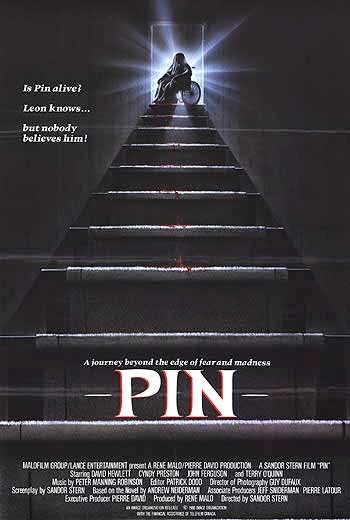

The fact that Klaus Kinski is in a given movie makes that film instantly watchable. Such was my mentality as I began watching the 1986 film, "Crawlspace." In a role unlike any other Kinski performance, he portrays a slightly insane man who appears to be at the edge of sanity. Kinski's Dr. Karl Gunther, in "Crawlspace," is a bit more subdued than his earlier performances in "Android," "Fitzcarraldo," and "Woyzeck." Those three films are magnificent, especially the Werner Herzog directed "Fitzcarraldo" and "Woyzeck."
Dr. Gunther is more reminiscent of Kinski's character in the 1980 slasher film, "Schizoid," in which he plays a psychiatrist. In "Crawlspace," Dr. Karl Gunther, a former head surgeon at the National Hospital in Argentina, has since become the landlord of a boarding house to young women. A boarding house for young women would never occur to me as the setting for a horror film. He will not rent out rooms to men. He would rather watch women through the air vents in their rooms rather than men, and, to be quite honest, I don't blame him. As one may expect, strange things are going on in this boarding house.
The lead female performance---the Adrienne King from Friday the 13th/Jamie Lee Curtis from Halloween---is supplied by Talia Balsam, daughter of the fine actor, Martin Balsam, who you may remember from "Breakfast at Tiffany's," "Catch-22," "The Anderson Tapes," or as Murray Klein, Archie Bunker's business partner on "Archie Bunker's Place."
Talia Balsam has appeared on several television programs including playing opposite her father on "Archie Bunker's Place" in a 1980 episode and has recently appeared on "Mad Men." In "Crawlspace," Balsam's character is named Lori. Being female, Lori is able to successfully procure a room in Dr. Gunther's boarding house. At least three other young women live in the boarding house, one of whom sings a terrible song, the title of which and any lyrics from I have successfully washed from my memory. I almost always love and appreciate the bad, awkwardly placed song in a low-budget movie, like in "The Alien Factor" or "Star Crystal," as that is like getting extra fries at the bottom of a McDonald's or Burger King bag. Unfortunately, this time, the song is so bad and the placement is so unromantic that it fails.
Despite this bad song, "Crawlspace" has a lot to offer. Aside from Kinski's performance which is, as usual, memorable, especially in a scene in which his character tears up as he is confronted with his father's past, the film features a woman, who at first I thought was a man, in a box-sized cage, mice, a cute kitty, and a line usually reserved for a porno film, "I think I'm about to come."
The last 15 minutes of the film slow down a bit as Kinski does not "act" as much in the final reel, inasmuch as he has to perform physically. I will always try to not give much away when discussing any given film, so I will abstain from any further mention of how the film concludes, other than my analysis that the conclusion is not as satisfying as what precedes it, something lots of men have certainly heard before.
In a Kinski film, I want to see him perform. For the first hour of the film, he certainly does so, and for this reason, not so much the plot of the film, which is not groundbreaking, especially by 1986, I recommend this film. "Crawlspace" is a film for a Klaus Kinski fan, not necessarily for a horror film fan. There are not enough surprises, gore effects, or anything else horror-related to make this film distinctive. Having said that, as I have established, if you enjoy watching Klaus Kinski perform, he does so enough in "Crawlspace" to make it worth watching. I give "Crawlspace" 3 out of 4 gray mice.



















































































No comments:
Post a Comment